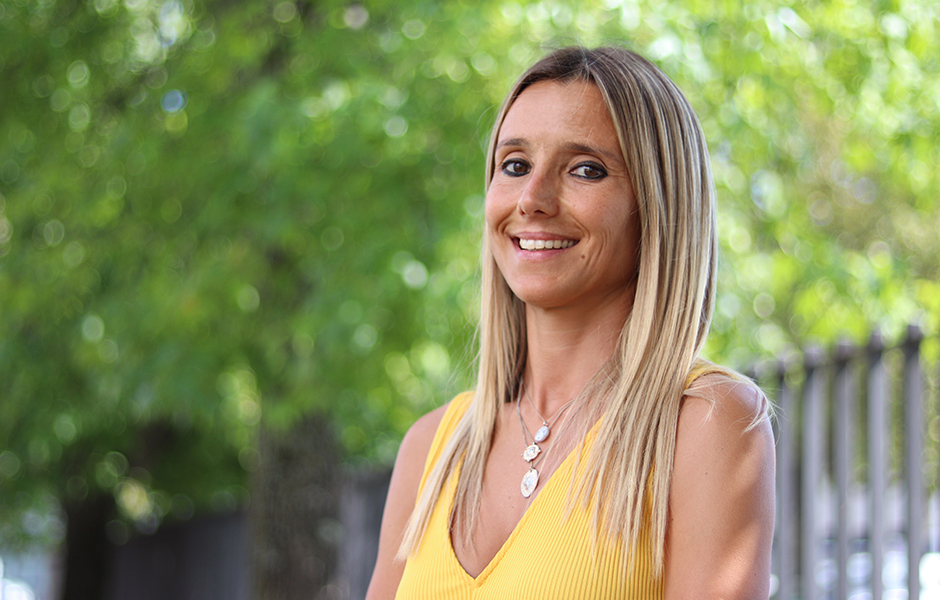Mafalda Duarte is an integrated researcher of the group AgeingC, at CINTESIS – Center for Health Technology and Services Research/ICBAS, with extensive work in the area of ageing, frailty assessment, and intervention in the elderly, and informal care.
She was born in 1980, in Barcelos, where she made her way from elementary school to her graduation in Psychology from the Instituto Superior da Maia (ISMAI), in 2002. “I realized very early on that I had a predisposition and a very particular interest in working with people,” she says.
In 2003, she joined, as a fellow, a research project of the Foundation for Science and Technology (FCT) in the area of ageing, with Constança Paúl, with whom she works until today. In this regard, she recalls: “It was my first contact with research, in a completely new world. The objective was to study the quality of life of elderly people in a rural context compared to an urban context.”
She was the technical director of a Home Support Service (SAD by its acronym in Portuguese) and of a Nursing Home Care while studying two masters: the European Master in Gerontology at the Vrije Universiteit Amsterdam (2005) and the Master in Social Gerontology at ICBAS (2006).
During her training she had the opportunity to get to know very diverse realities while visiting several European universities, such the Institute of Gerontology, University of Heidelberg (Germany); the Center for Social Gerontology, Keele, United Kingdom; the Center de Gérontologie Hôpital Sainte Périne, at Versailles-Saint-Quentin, Yvelines University, France; the Center for Health Sciences, Tallaght Hospital, Ireland; the European Center of Gerontology and Geriatrics, University of Malta, and the Center for Research on Health and Aging – Institute for Health Research and Policy, University of Illinois, USA.
In 2006, she began teaching at the Instituto Superior de Saúde (ISAVE) (Higher Institute of Health), where she develops her academic and research career. In 2008, she was accepted in the Doctoral Program in Biomedical Sciences of ICBAS but later, she changed to the Doctoral Program on Gerontology and Geriatrics, which was eventually created in the same institution. Her project was about frailty and predictive factors, an area of study that is still very recent and has yet to be explored. At the same time, she integrated the network (European Innovation Partnership for Active and Healthy Ageing) headquartered at the European Commission, in Brussels where she integrated a group on the area of frailty.
She wrote the manual “Fragilidade em Idosos – Modelos, Medidas e Implicações Práticas” (Frailty in the Elderly – Models, Measures, and Practical Implications), a groundbreaking work on the fragility of the elderly in Portugal which is still for sale. Based upon a continuity logic, she worked with ICBAS / Faculty of Pharmacy / Porto4Ageing, developing an application for smartphones to assess frailty in the elderly.
Her interests also include knowing the reality and challenges experienced by informal caregivers. In this context, she integrated the project “Cuidar em Casa” (Caring at Home), funded by the High-Level Commission for Health, which resulted in the national project CuiDEM and in the international counterpart Care4DEM (Erasmus K”), aimed at creating support tools for informal caregivers of elderly people with dementia.
She is also a researcher at Best4OlderLGBTI, a project aiming to bring awareness of LGBTI issues among older people. CINTESIS is a partner in both projects, currently assigned to the CA50+ Association of which Mafalda Duarte is the chair.
In 2015, she took office as president of ISAVE and has been responsible for a new form of scientific-pedagogical management and for the recovery of the Institute, which today has about 300 students distributed over four pregraduate programs and six technical programs (CTeSP). Mafalda Duarte highlights the close link that has been established between CINTESIS and the ISAVE students, professors and staff, through collaboration in research tasks.
1-Year Ambition
In terms of ISAVE’s presidency, the objective has always been to recover and revitalize an educational and scientific project, which needed a strategic vision and foundations to achieve some goals. Currently, the priority goes through research and development, as part of internationalization.
I want to contribute to creating structures that promote critical thinking and research thinking and that continue research projects with applicability in adapting responses to the current and future needs of the elderly, institutions, and informal care networks.
Taking into account the current national situation, with COVID-19, we realize that older people, namely those living in institutions, need specialized care. We need to create conditions for such care to be possible.
10-Year Ambition
I try to give an effective and efficient answer, in a very humanized logic. I value people, whether it is in terms of the quality of the training of the health technicians, in terms of the attention/care these professionals provide to the public they work with, or in terms of research, and with the constant concern for older people.
In fact, if 10 years from now I am still working on these research problems and I continue to inquire about others that may arise, I will be on the right track.
Life Beyond Teaching and Research
(laughs) Well, I don’t have a lot of free time. I work with many different teams and in different contexts, which requires a lot of flexibility. I value simple things, such as going to the beach, reading a book, taking a trip, or small moments that revitalize me and allow me to find myself again.
With the pandemic, I am telecommuting and it is even more difficult to hang up. Nowadays, work is in the same house we live in, which makes it more difficult to define spaces. I have tried to dose the work and the moments for myself, so I cycle and/or go for a walk (to the sound of my music). I make a very conscious effort to impose these “time outs” on myself.

